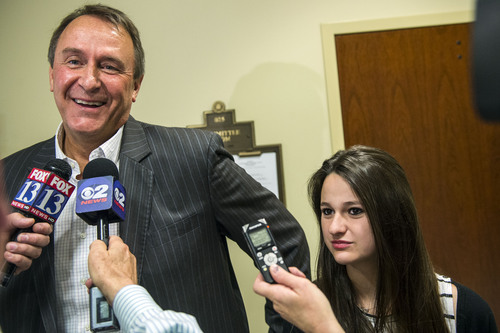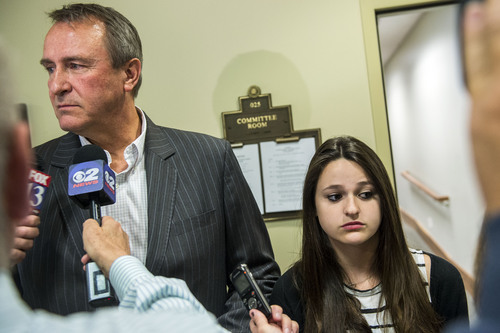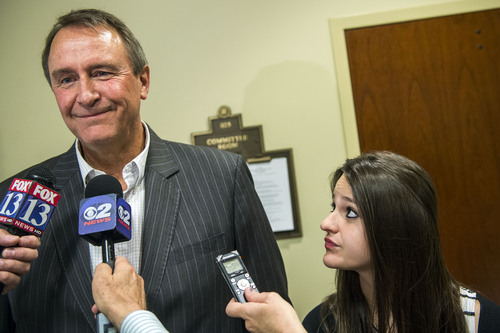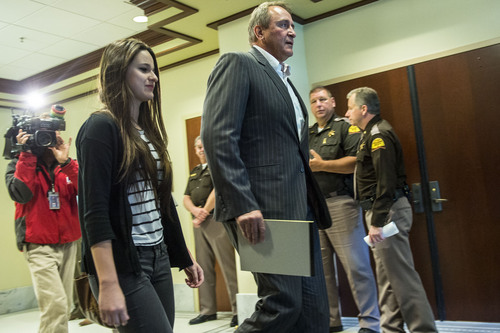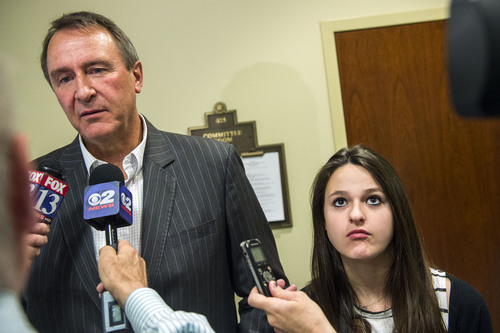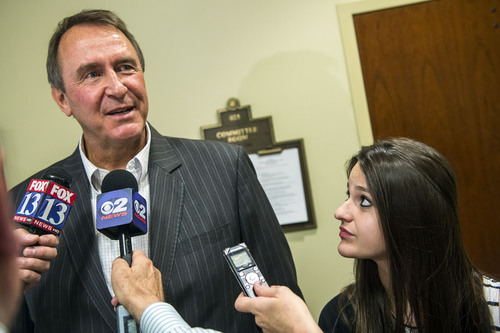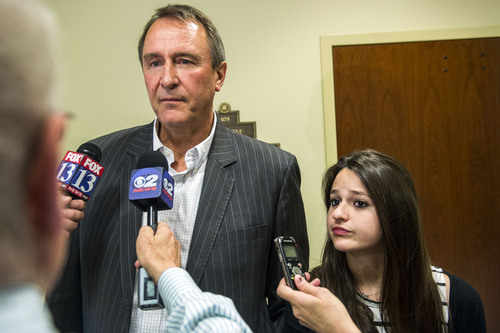This is an archived article that was published on sltrib.com in 2014, and information in the article may be outdated. It is provided only for personal research purposes and may not be reprinted.
State law enforcement officials say FBI agents executed the search warrant on Mark Shurtleff's home earlier this month — a raid the former three-term attorney general has blasted as displaying "Dirty Harry" tactics that terrorized his family.
"In this specific case, the team that went in to do the securing of the residence you're talking about was a team outside the Department of Public Safety," Utah Highway Patrol Col. Danny Fuhr told members of the Legislature's law enforcement committee Wednesday.
"We were not there," Fuhr said. "Not that that agency did anything wrong. But it was not us and not our eyes that [saw] it."
Maj. Brian Redd, director of the State Bureau of Investigation, said FBI agents went into Shurtleff's home June 2 and secured the Sandy residence so a team of state investigators could collect evidence
The FBI also secured the Sandy residence of Shurtleff's successor, former Attorney General John Swallow, on the same day.
Both search warrants were authorized as part of a long-running criminal corruption investigation of Swallow, Shurtleff and others.
On Thursday, the FBI pointed to a statement the Utah Department of Public Safety issued the day after the searches. That release did not respond directly to Shurtleff's allegations, except to say that DPS and FBI personnel followed proper procedure "and lawfully and legally served search warrants in conjunction with the ongoing Shurtleff/Swallow investigations."
"Law enforcement personnel acted in accordance to policy," it said, "and utilized the minimum force necessary to execute the warrants and ensure officer safety in an unknown environment."
After Wednesday's hearing, Shurtleff — who sat in the second row with his 17-year-old daughter, Annie — reiterated that the tactics used in the search were over the top. It is disingenuous, he said, for the State Department of Public Safety to try to wash its hands of any culpability in the search since state investigator Scott Nesbitt signed the affidavit to obtain the warrant.
"It's their agent who got the warrant," Shurtleff said. "He has been in charge the entire time … and to pass it off in here as 'we don't know what happened, the FBI did it,' is unacceptable."
Shurtleff has said that officers forced their way into the home with guns and automatic weapons drawn, ordered his daughter out of the bathroom with a laser sight on her chest, and rummaged through the home, emptying drawers and leaving the residence in disarray.
"They pointed guns at my daughter. You can see her. Does she look like a threat?" said Shurtleff, who vowed that the agents ultimately will be put on the witness stand in a court proceeding — either civil or criminal — and cross-examined about what happened. "They violated the law is what they did."
He would not say if he plans to sue over the search.
"I can just say I was scared and terrified," Annie Shurtleff said. "It shouldn't happen to anybody. It's not OK."
Fuhr told lawmakers that investigators decided when to execute the warrant and noted that the tactical teams go through a threat matrix approved by a judge to decide how much risk is involved and how much force is necessary.
Sen. Todd Weiler, R-Woods Cross, who has been critical of Shurtleff in the past, suggested that everything seemed to have been done by the book, at least from the state's standpoint.
"So, it was a properly issued warrant and served pursuant to policies and procedures that the department has been using for years?" Weiler asked.
"Yes," Redd replied.
Fuhr said that, hypothetically, if he was securing a home and an unknown person was in a bathroom, he would likely find a position where he was protected and order the person out of the bathroom. Officers, he said, have to be cynical when doing a search because of the unknown dangers.
"We have had too many cases where officers are killed," Fuhr said
Meanwhile, the Legislature's Government Operations Interim Committee examined possible changes to state law emerging from the House's $4 million probe of Swallow.
The most important, according to Rep. Jim Dunnigan, R-Taylorsville, chairman of the investigative committee, is giving future legislative inquiries the authority to go to a grand jury to obtain subpoenas to compel witnesses to provide information.
Dunnigan noted that, during the Swallow investigation, nine of the committee's subpoenas were ignored or fought in court.
"It took time, effort, resources and money to do that, and I believe it was a strategy from some of those we'd subpoenaed," Dunnigan said. "They wanted to delay and try to wait us out and run up the tab in order to discourage us."
Jason Powers, Swallow's campaign consultant, for example, resisted subpoenas issued to his business and a series of political action committees he ran.
Officials at Provo-based Check City, whose late founder Richard Rawle played an important part in the Swallow scandal, also fought a subpoena issued to the payday-lending company.
A grand jury subpoena would be harder for parties to resist.
The Legislature passed a bill last session to strengthen legislative subpoenas, but Gov. Gary Herbert vetoed it, fearing it went too far in keeping the party from challenging the demand in court.
The committee also discussed proposals that would require major campaign donors — anyone giving more than $5,000 to a candidate — to file a disclosure report and bar lawyers in the attorney general's office from doing outside legal or consulting work.
gehrke@sltrib.com Twitter: @RobertGehrke


